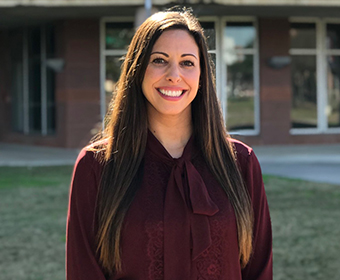
Fahmy's research focus includes assessing the implications of street and prison gang membership on reentry and recidivism.
(Jan. 24, 2019) -- Chantal Fahmy is an assistant professor in the College of Public Policy’s Department of Criminal Justice. She earned her bachelor’s degree in Criminology, Law and Society from the University of California, Irvine, a master’s in Criminal Justice from California State University, Long Beach and a Ph.D. in Criminology and Criminal Justice from Arizona State University. While earning her Ph.D., she received the Bureau of Justice Statistics Graduate Research Fellowship to complete her dissertation project.
Fahmy’s primary research interests include prisoner reentry and reintegration, social support and health in institutional corrections. Her work has been published in Deviant Behavior, Environment and Behavior and the International Journal of Offender Therapy and Comparative Criminology.
Recently, she has studied social support’s effects on inmates’ physical health and just presented her work at the annual meeting of the American Society of Criminology in Atlanta.
We sat down with Professor Fahmy this week to learn more about her research.
What’s exciting you the most these days?
The project that's most exciting to me right now is the LoneStar Project. This is a project based out of Texas prisons and funded by the National Institute of Justice that I helped manage while getting my doctorate. We interviewed over 800 male prisoners one week before their release to the community and then one month and nine months post-release.
The LoneStar Project has five major research questions centered around assessing the implications of street and prison gang membership on reentry and recidivism. Specifically, my contributions focus on the physical health and social support of reentering ex-prisoners. Although we have finished collecting data, most of the major research findings have yet to be published...stay tuned!
How has your personal journey influenced your work?
I grew up in a non-white immigrant family—who stayed very close to their roots—in a nearly all-white, suburban school and community. Because of this, I happened to look at things differently than my friends in school. Some of the things I was taught or some of the behavioral guidelines I learned at home and at school were almost at odds with one another.
I believe my upbringing forced me to question everything and my curiosity grew from there. This inevitability made my approach to research broader by trying to encompass a multitude of viewpoints on a given topic. Incorporating multiple viewpoints in research allows me to better understand issues in the criminal justice system and, consequently, has given me a keen eye to examine disparities within the criminal justice system.
What’s the one thing going on in your field that nobody’s talking about?
I think researchers could do a better job in talking amongst ourselves about our research and its findings across disciplines such as public health, political science, economics and social work. By doing this, we could better grapple with issues that demand a comprehensive approach or solution.
In other words, there are plenty of potential interdisciplinary collaborations, yet we rarely study the criminal justice system without a lens that is already inherent within the system.
What drew you to UTSA?
The community! It was clear to me during my campus interview that there is a real bottom-up approach to the research being done at UTSA. It is evident that faculty and students alike are permanent fixtures in San Antonio and that our research directly affects residents' and communities' well-being. It is my hope that my research will impact those in the San Antonio community through proper preparation, acceptance, and welcoming of ex-prisoners desiring to become successful residents.
Any advice for this generation of students?
Don't give up! Perseverance pays off! There will be some tough challenges that today's college students have to face, but the next generation of academics and policymakers is needed now more than ever in these uncertain and fearful times in our nation.
Learn more about the UTSA College of Public Policy and the Department of Criminal Justice.
Celebrate UTSA’s 50th Anniversary and share social media posts about the 50th using the hashtag #UTSA50.
Connect with UTSA online at Facebook, Twitter, YouTube, Instagram and LinkedIn.
UTSA Today is produced by University Communications and Marketing, the official news source of The University of Texas at San Antonio. Send your feedback to news@utsa.edu. Keep up-to-date on UTSA news by visiting UTSA Today. Connect with UTSA online at Facebook, Twitter, Youtube and Instagram.
Move In To COLFA is strongly recommended for new students in COLFA. It gives you the chance to learn about the Student Success Center, campus resources and meet new friends!
Academic Classroom: Lecture Hall (MH 2.01.10,) McKinney Humanities BldgWe invite you to join us for Birds Up! Downtown, an exciting welcome back event designed to connect students with the different departments at the Downtown Campus. Students will have the opportunity to learn about some of the departments on campus, gain access to different resources, and collect some giveaways!
Bill Miller PlazaCome and celebrate this year's homecoming at the Downtown Campus with food, games, giveaways, music, and more. We look forward to seeing your Roadrunner Spirit!
Bill Miller PlazaThe University of Texas at San Antonio is dedicated to the advancement of knowledge through research and discovery, teaching and learning, community engagement and public service. As an institution of access and excellence, UTSA embraces multicultural traditions and serves as a center for intellectual and creative resources as well as a catalyst for socioeconomic development and the commercialization of intellectual property - for Texas, the nation and the world.
To be a premier public research university, providing access to educational excellence and preparing citizen leaders for the global environment.
We encourage an environment of dialogue and discovery, where integrity, excellence, respect, collaboration and innovation are fostered.